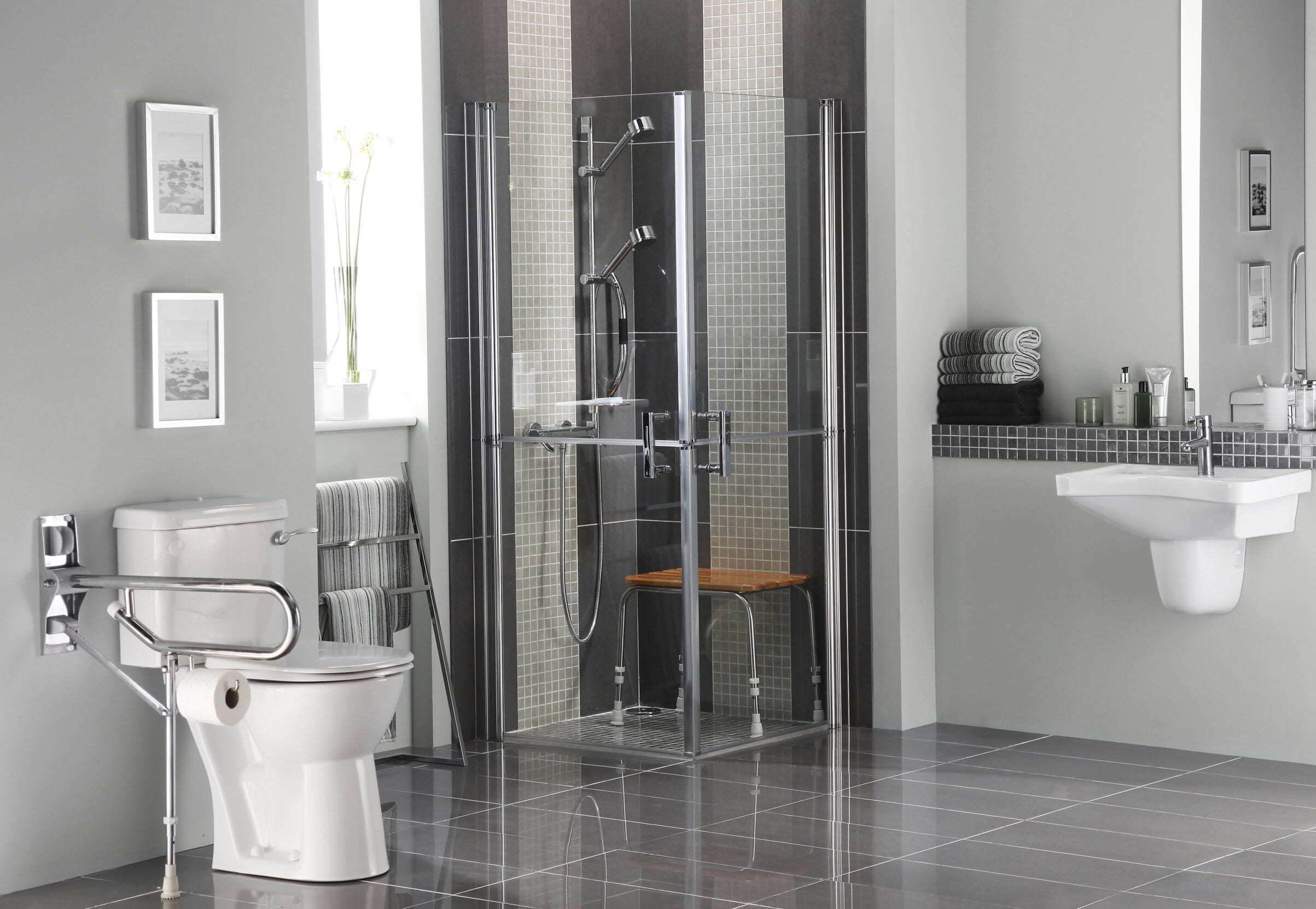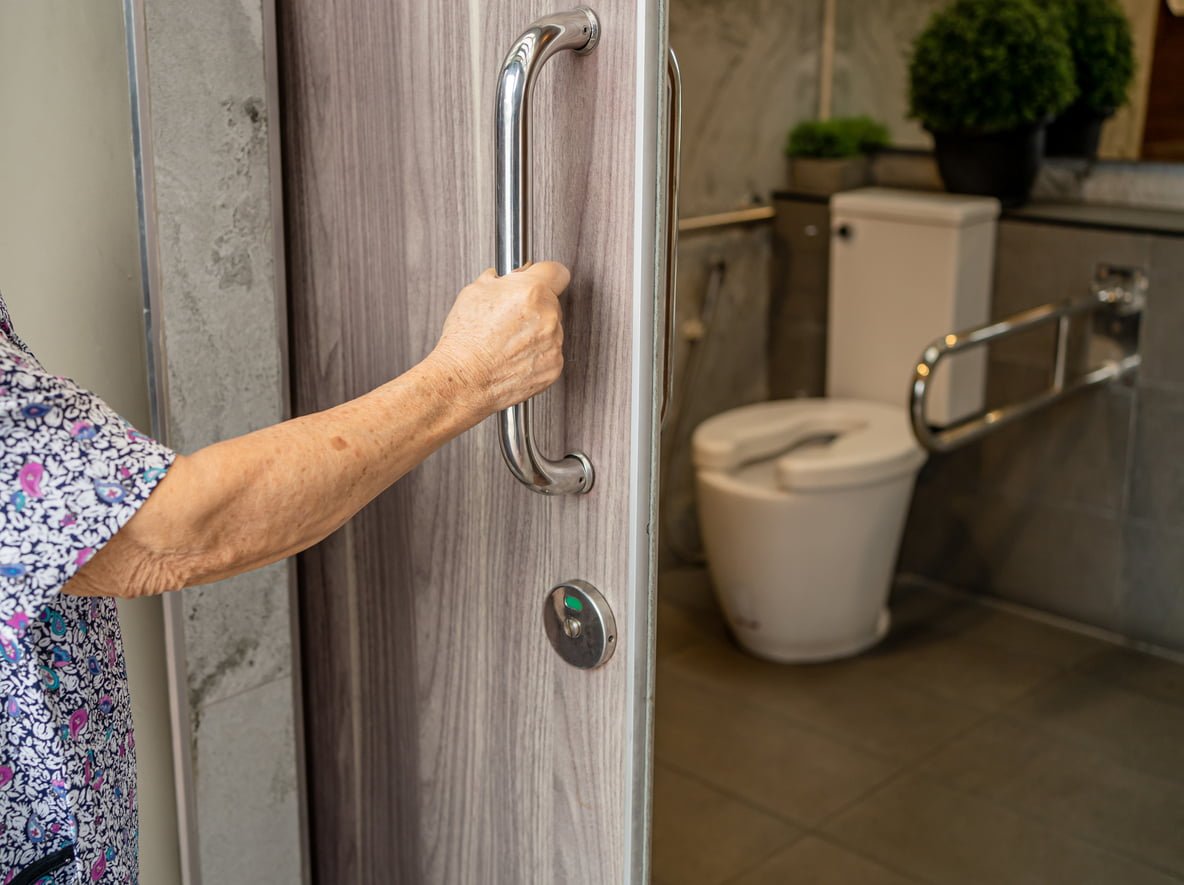
Bathroom Modifications that restore your independence
A well-configured bathroom space will enable you to take care of your personal hygiene, safely and on your own terms.
Bathrooms can create barriers that affect your ability to wash, shower, and look after your hygiene independently. NDIS bathroom renovations can update your bathroom, replacing inaccessible fixtures and adding accessible alternatives that make it easier for you to look after your own hygiene independently.
From minor additions like toilet safety rails and wall-mounted shower seats, to roll-in showers for wheelchair users, the right modifications can help you achieve freedom and restore your independence. Our team has experience designing and installing different modifications for people living with a range of conditions.
NDIS Bathroom Modifications
We offer a range of NDIS bathroom renovations and modifications to help you create the bathroom you need to live independently. From shower modifications to bidet installation, our experienced team of builders and occupational therapists work closely with you to design and implement customised solutions that meet your unique needs.
Our NDIS approved builders can make your bathroom more accessible with a range of modifications:
How we work
We understand that every client has different requirements when it comes to home modifications. That’s why we offer a comprehensive service that includes consultation with an occupational therapist, design, construction and post-build support. Our customer service team is always on hand to ensure a smooth and hassle-free experience.
Our bathroom modification builders make it our mission to make your experience as painless as possible:
- You are our #1 Priority
- We are passionate about accessibility
- We treat your property like it’s our own
- We perform all approved bathroom modifications from approval to final inspection
- We work closely with your OT and case manager to streamline the process
- Fixed-price quotes ensure you don’t receive any unexpected surprises
- Ongoing repairs and maintenance services
If you’d like to chat to our friendly and experienced team of bathroom modification specialists, call 1300 333 746 or request a quote to see how we can restore your independence.

Ready to learn more?
Contact us today or keep exploring to learn how we can support your NDIS home modifications needs and help you live more independently.
Restore Home Modifications was founded by allied health professionals with extensive experience supporting NDIS participants. We know the importance of well-designed, accessible spaces, as well as the impact it can have on your everyday life.
Frequently Asked Questions About NDIS Bathroom Modification
Each NDIS participant is unique, with their own goals and needs – as such there’s no one-size-fits-all bathroom solution. However, there are some common requirements:
- Shower access – traditional shower cubicles can be difficult to enter, and may not allow enough space for mobility aids
- Fall prevention – people with disability are at a higher risk of slipping and falling, especially in bathrooms where surfaces are often slippery
- Doorways – some participants may face challenges entering and leaving the bathroom
- Toilet access – toilet handrails can support easier transfer, while wall removal can make toilets easier to use by creating more space around
- Fixture replacement – fixtures such as lever-style taps and handheld showerheads are easier to use for participants with fine motor skill impairments
Given that falls are the most common type of bathroom injury, replacing slippery tiles with non-slip alternatives can making the bathroom significantly safer for people with disability.
Unlike regular bathroom tiles, anti-slip tiles have a coarse or textured coating that creates friction. This reduces slipping, even when tiles are covered in water or suds.
Australian Building Standards set out different slip-resistance ratings, with the Pendulum Test generally used for residential use. For NDIS participants with a higher risk of slipping, it’s generally recommended to install R11 or R12-rated tiles, as these provide a higher level of slip-resistance.
Our NDIS bathroom specialists can replace existing tiling with slip-resistant tiles in bathrooms, as well as in kitchens, laundry rooms, and other high-risk areas.
Yes. The NDIS may provide funding for a range of NDIS home automation solutions that can support your ability to use the bathroom independently. For occupational therapists looking for bidets, our team of NDIS builders can collaborate with you to prescribe a bidet that’s
NDIS bidet installation is just one example – other types of bathroom automation can include:
- Sensor-activated lighting
- Automated temperature control
- Motion-activated taps
- Self-flushing toilets
Yes! Handrail installation is a relatively simple job that our NDIS builders can offer for many rooms in your home, including especially high-risk rooms like the bathroom.
This includes installing handrails for shower cubicles, which can improve shower accessibility and safety, as well as toilet handrails to support safer toilet usage.
Most traditional showers have a small lip or step. For people with disability, this can often be a tripping hazard and make entry into the shower more challenging to navigate. Stepless showers and roll-in showers remove this lip, creating a seamless surface that eliminates this risk and makes entry or egress easier.
In addition to removing the step, roll-in showers also frequently use open shower designs without any cubicle walls or doors. This creates more space for residents and allows NDIS participants who’ve been prescribed shower commodes, stools, and other assistive aids to use them in the shower.
Whether your NDIS builder uses a prefabricated stepless base or inserts, or builds a custom cubicle, installing a stepless shower comes with a number of steps:
- Removing the existing shower base and subfloor
- Removing existing doors and glass from the existing cubicle
- Adjusting plumbing and drainage pipes (if required)
- Installing recessed drains
- Waterproofing and sealing
In many cases, stepless shower base installation may be classified as a complex home modification. In these cases, you may be provided additional funding for an NDIS-registered building works project manager to oversee your project.
In addition to slipping, hot water scalds and burns are another common hazard many people who live with disability may face when using the shower. Thermostatic Mixing Valves (TMVs) are plumbing devices that prevent this by continuously mixing a specific amount of cold water into the hot water supply. This ensures the water never exceeds a set temperature, reducing the risk of hot water burns and scalds.
In addition to precisely maintaining a comfortable and safe temperature, TMVs can also quickly correct unexpected temperature fluctuations.
In Australia, Thermostatic Mixing Valves are only mandated in buildings that service the general public, as well as facilities that service more vulnerable individuals such as schools, hospitals, and aged care facilities. Residential homes in Australia are only required to install Tempering Valves (which are cheaper and less effective than TMVs).
Many NDIS participants however fall into a higher risk category, and thus may receive funding for Thermostatic Mixing Valves to be installed in their home’s hot water system. Our NDIS bathroom modification specialists have experience with a wide range of plumbing modifications, including upgrades such as thermostatic mixing valve installation.
In addition to comprehensive bathroom renovations, the NDIS will also provide funding for minor modifications. Lever tap handles are a good example of this, as they are easier to manipulate for people who live with fine motor disability compared to traditional knob-style taps.
- Disability bathroom renovation/bathroom renovations for people with disability (Melbourne)
- NDIS approved bathroom renovation contractors


